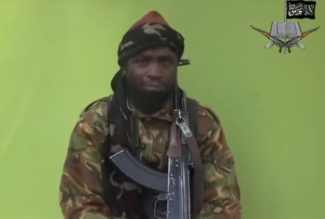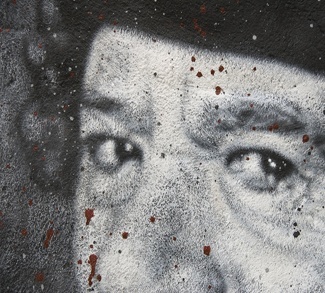The recent destruction of 540 houses in northeast Nigeria by Boko Haram would suggest little has changed for the group that has wreaked havoc across the country for the past five years. However, if rumors are to be believed, the group’s mysterious leader Abubakar Shekau has recently been killed. Thus the obvious question is: What will be the impact on the group and its operations, if any?
But first: Is Abubakar Shekau even dead?
Open source intelligence can provide the starting point for our investigation. Photographs have surfaced that purportedly show Shekau dead, killed by the Cameroonian military. Confusingly, this has already been disputed by the Nigerian military, who claim that the photographs are of a Shekau impersonator, and that the real Shekau was actually killed months ago during the recent fighting, although they have failed to specify when and where he was killed.
This isn’t the first time that Shekau has supposedly been killed; twice the Nigerian army has reported his demise, first in 2009 after fighting in Maiduguri and next in 2013. Yet both times he has resurfaced, which has in part contributed to his aura of invincibility.
The ambiguity in reporting by the Nigerian government is further compounded by local reporting from the prominent Nigerian journalist Ahmad Salkid, who has become a semi-reliable conduit of information from Boko Haram. Salkid claimed on Twitter: “mark my words: I have it on authority that Shekau is alive & well.” To add to this evidence, a video has now appeared which apparently features Shekau dismissing claims he has been killed.
According to John Campbell at the Council on Foreign Affairs, his death “may not matter that much,” as “Boko Haram is more than Abubakar Shekau, alive or dead.” While it is clear that the death is unlikely to lessen the threat from Boko Haram, a deeper understanding of the impact of Abubakar Shekau on the evolution of Boko Haram would suggest that his death could definitely have implications for the tactics used by the militant group.
A data analysis piece completed at Cytora, which looked at the spatial and temporal distribution of Boko Haram attacks before and after the introduction the state of emergency in 2013 in the North Eastern states of Yobe, Adamawa, and Borno, suggests the group has been increasingly focusing its operations in the northeast of the country, and targeting civilians at a higher frequency. This pattern should not just be attributed to the state of emergency restricting the group’s spread, but also Shekau’s own ideology, which has been as critical in transforming the group after the death of previous leader Muhammad Yusuf. It should be kept in mind that Boko Haram’s initial existence was not marred by violence, and while there is evidence that the group was becoming increasingly militant towards the end of 2009, it was only after the clampdown on the group by the authorities and the execution of the groups’ leader that their operations spiraled into sustained violence.
Here is a clear example of how open source intelligence can be combined with wider analysis to test and validate hypotheses:
Figure 1 – Boko Haram attacks in 2012
Figure 2 – Boko Haram attacks in 2013
Shekau as Yusuf’s number two was in prime position to take the reins of leadership and shape the organization in line with his own ideology. Setting up the Shura council, a 30-person group, and filling it with his supporters has seen him further cement control of the group. An example of Shekau purging the group of potential rivals is the case of Abu Muhammed. Sensing the rise of Shekau could be problematic Muhammed, fled to Algeria to be under the protection of AQIM, however Shekau seeing him as a continued threat eventually gave away his location to the Nigerian security forces upon his return, which would go on to kill him.
However, what is often under-reported is that various schisms remain in the leadership of Boko Haram. And while Shekau has established his control, if he were removed, these fissures may cause the group to evolve in new ways. Central to Shekau’s tactics has been the focus on the near ‘near enemy’ driven by his allegiance to the tafkiri ideology, while other notable leaders including Khalid al-Barnawi, Mamman Nur and Adam Kambar are more influenced by the Wahhabi ideology, favoring a transnational agenda rather than just a domestic one.
These differences have bled into the group’s outside allegiances. In the aftermath of the killing of Yusuf, the leader of AQIM, Abdelmalek Droukdel, offered his “Salafist brothers” in Nigeria “men, weapons, and ammunition to gain revenge on Nigeria’s ruling Christian minority.” This comes in a wider context of AQIM trying to expand its influence across the Sahel, Nigeria included, with reports of Boko Haram fighters receiving training in Mali, Somalia, Cameroon and Niger serving to highlight AQIM’s expanding influence. However, it is believed that they do not have direct influence over Shekau, and in fact rely upon their relationships with al-Barnai and Mamman Nur, which to some degree puts them in conflict with Shekau. The issue has been further complicated by the rise of the Islamic State in Iraq and Syria, and its split from central Al-Qaeda leadership. Shekau’s position on the matter is unclear. A video released in mid-July showing him offering support, “May Allah protect you,” to not only Abu-Bakr al-Bagdadi of Islamic State, but also Ayman al-Zawahiri and Mullah Omar, the leaders of Al-Qaeda and the Taliban respectively.
If Shekau actually has been killed we should expect changes, especially in the long-term evolution of Boko Haram. This does not translate into a reduced threat level, but rather increasing the probability of closer integration with AQIM, meaning a potential focus on transnational jihad parallel to ongoing operations in Nigeria. However, from piecing together open source intelligence it seems for the time being at least that Shekau is most likely alive, and he will maintain his grip on Boko Haram. As a result, we should see a continuation of their current trajectory in terms of operations and tactics.





